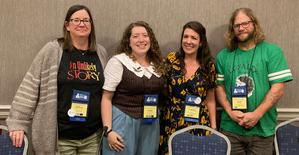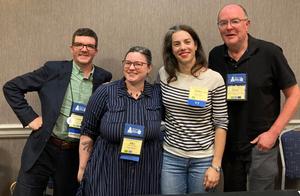On Wednesday morning at NEIBA's 51st annual fall conference, held in Newton, Mass., a group of knowledgeable booksellers, bookstore owners, and industry professionals greeted newcomers to NEIBA and bookselling at the "New-to-NEIBA Bootcamp" panel. Liz Whitelam, incoming NEIBA board president and owner of Whitelam Books in Reading, Mass., moderated the group which included Sam Kaas, co-owner of the Norwich Bookstore, Norwich, Vt., Keith Arsenault, sales rep, Chesapeake & Hudson, Jason Rice, wholesale rep, Ingram, and Cedar Fields, NEIBA member relations manager and registration coordinator for the American Booksellers Association. The group discussed tips and tricks for attending the conference itself, suggesting newbies talk to everyone, prioritize selfcare, and remember to be judicious about the things they take--"Do take a million things, but maybe a million minus one," Whitelam said, "Because you'll be living with your choices." Kaas and Whitelam gave a primer on attending bookseller conferences--explaining keynotes and how rep pick lunches work--while also giving suggestions on certain traps to avoid as a new store owner: "Make sure you have an understanding of cash flow: what you're going to need, what you can expect, and what you can have on hand."

|
|
| From l.: Liz Whitelam, Sam Kaas, Keith Arsenault, Jason Rice, and Cedar Fields | |
Rice and Arsenault spoke about how they as sales reps and wholesale reps can help new bookstores make their opening store order, decide on POS systems, and figure out how to use iPage. While it's a challenge, Rice said, "I can walk you through different things. I like to think of myself as a connection maker." Fields focused on how ABA can help new bookstores and booksellers, telling the room that "ABA has dozens and dozens and dozens of forms of educational content. What we can do is hook you up with resources to make the best decision for your store. Our industry is full of a wealth of knowledge and experience."
In the afternoon, Emily Gilbow of House of Books, Kent, Conn., moderated "The Art of Handselling," featuring Melissa Lavendier, general manager of An Unlikely Story in Plainville, Mass., Lauren Tiedemann, co-owner of Book Ends, Winchester, Mass., and Josh Cook from Porter Square Books, Cambridge, Mass. The group discussed approaching browsing customers, recommendations, and upselling. "I like to coincidentally straighten a shelf near where the customer is," Cook said, "or strategically grab books that need to be shelved. That way it's not a targeted strike on them and it allows for as much conversation as they want." That is what bookselling--as opposed to book "finding"--is about, Lavendier said. "It's more 'conversation selling' than it is 'handselling.' We all love books. Sharing that passion never feels like selling, but that passion translates to sales." That, Gilbow noted, "is what we're really talking about: upselling. How do you approach that?" Lavendier has an unusual approach: "I always say this is probably not the last book they're ever going to read, so you shouldn't feel bad about upselling to them. If it is the last book they're every going to read--if they tell you that this is the last book they're ever going to read--don't upsell." Cook added that "it is much easier to get someone who is already spending $45 to spend $60 than it is to get someone who wasn't planning on spending any money to spend $15."

|
|
| From l.: Melissa Lavendier, Emily Gilbow, Lauren Tiedemann, and Josh Cook | |
The group also discussed the "build a basket" technique and how to effectively use social media to handsell. Tiedemann said her booksellers don't only "build baskets" with individual customers while handselling, they also use the technique for displays: "You have the anchor book that customers are familiar with and then surround it with similar books and related items." Social media, the panelists said, is an additional way to handsell. "Go with what your booksellers know," Cook said, "If they're on Instagram, pitch books there. If they're on TikTok, pitch books there." Lavendier pointed out that "comfortability is a very important part of social media," but the more people from your store who are a part of your media presence, "the more reflective that is of your community." On most Tuesdays, Tiedemann records employees who are comfortable with social media quickly pitching a book they're particularly excited about. She also said that employees who are not interested in social media can still take part in this brand of handselling--"social media posts do better if there's a human part in the book," she said. "It doesn't have to be a face--it can just be a hand holding the book."
A panel discussing what they called "Backroom Bookselling" and B2B sales was led by Steve Iwanski, founder of Charter Books in Newport, R.I., and included Alex Schaffner, community engagement coordinator of Brookline Booksmith, Brookline, Mass., Katya d'Angelo, owner of Bridgeside Books, Waterbury, Vt., and Kenny Brechner, owner of Devaney, Doak & Garrett Booksellers, Farmington, Maine. "In 2024, it's not enough to hang a sign outside that says 'BOOKS' and expect foot traffic." Iwanski started. "You have to supplement that traffic with what we're calling backroom bookselling: things that take you outside the standard business model." Schaffner expanded: "We're talking about any way you can move a lot of one book or a lot of books to one customer that aren't people walking in off the street." For Brookline Booksmith, Schaffner said this includes corporate orders, acting as prime booksellers for authors, partnerships with the MSPCA, and doing events with people and companies interested in having a person onsite to sell titles. D'Angelo's store focuses on "partnering with other organizations or businesses that we can cross market with--we go the creative route to find new people." And Brechner said he does a lot of outreach with schools, working closely with librarians, teachers, and administrators. "I have two basic principles," Brechner said, "every transaction should benefit everyone involved and you should always ask how you can add value to the transaction."
 |
|
| From l.: Steve Iwanski, Alex Schaffner, Katya d'Angelo, and Kenny Brechner | |
Suggestions to develop similar partnerships were plentiful: focus on your customer community, your local authors, your reps; create relationships with local business owners and make sure to support them; create "wide and deep" (Brechner) roots with institutions by getting to know several people at companies, non-profits, libraries, and schools; make donations to local non-profits with whom you'd like to work. And, as Schaffner said, "Being organized and competent just one time can be a homerun with these partnerships."
As for B2B selling, "it's a really specific term for when books are being purchased by a customer to be given out by that customer," Schaffner said. Brechner noted that the rules of engagement change from publisher to publisher, but d'Angelo assured the audience it's not hard to begin making these types of sales. "Pulling it off" can be a bit more difficult, though. "When you're starting to make this a part of your business," Schaffner said, "make a process for it. Create a central repository for all your information. Everything follows the exact same trajectory every time--make sure you have a step-by-step process and communicate clearly and frequently with the customer." Brechner and d'Angelo agreed, and Brechner added, "Too much communication is not enough--you need way too much communication." --Siân Gaetano, children's and YA editor, Shelf Awareness

